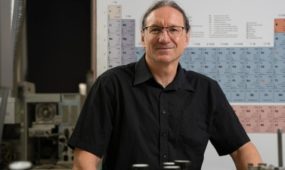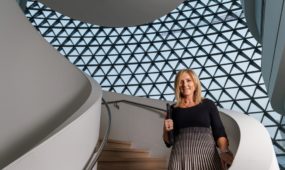Flinders launches new palaeontology labs
Education
Internationally acclaimed writer, scientist and explorer Tim Flannery launched a $1.1 million palaeontology research, learning and teaching space at Flinders University in South Australia yesterday.

Sign up to receive notifications about new stories in this category.
Thank you for subscribing to story notifications.
One of Australia’s best-known scientists, Professor Flannery discussed the role of Flinders University’s world-leading palaeontology research in understanding climate change and global warming.
“What this lab complex allows us to do is rewrite the history of our country – and that's being done right here at Flinders University,” Professor Flannery said at the launch.
“For example, the work that's being done on Kangaroo Island has revealed that up until very recently, about 200 years ago, Kangaroo Island had a much more diverse fauna than what's there today.
“What that palaeontology research is telling us is that Kangaroo Island has a lot more potential to act as a refuge for endangered fauna than we could have ever imagined.”
Based in the School of Biological Sciences, the new palaeontology hub includes academic offices, a dedicated microscope room with cutting-edge technologies, a research lab housing Flinders’ large fossil collection, an outdoor wet lab, a preparation suite and a library with more than 50 years of paleontological research and data.
Flinders Strategic Professor in Palaeontology John Long – who recently created headlines around the world for his profound discovery of the origins of sex – said the lab is home to the biggest vertebrate palaeontology group in the Southern Hemisphere.
“The Palaeontology Research Group at Flinders is a highly productive, internationally esteemed team of experts who are making major discoveries on globally significant issues, publishing in the world’s leading science journals and attracting millions of dollars in grants,” Professor Long said.
“Our research spans the entire vertebrate record, including birds, reptiles, mammals and fossil fish from around Australia and the four corners of the globe, with a focus on solving major issues underpinning evolution and ecology,” he said.
The Palaeontology Research Group at Flinders includes Australian Research Council (ARC) Future Fellow Associate Professor Gavin Prideaux; an expert in Australian mammal evolution, extinction, biodiversity and environmental changes; ARC Discovery Early Career Researcher Award Fellow and Vice-Chancellor’s Postdoctoral Research Fellow Dr Trevor Worthy, a leading vertebrate palaeontologist specialising in fossil birds of the Asia-Pacific region; and Strategic Professor in Palaeontology John Long, an expert in the early evolution of fossil fish, an author of more than 30 popular and academic books and a Guinness World Record holder.
Associate Professor Prideaux said Flinders Palaeontology Department is well on its way to becoming Australia’s foremost centre of palaeontology research and academic excellence, with a large team of PhD students, postdoctoral research fellows and academics joining the department in 2015.
“Flinders is the only university in South Australia to offer a dedicated vertebrate palaeontology undergraduate topic, which is going from strength to strength each year,” Associate Professor Prideaux said.
“It’s also the best environment to study palaeontology at an honours and postgraduate level because of our world-class facilities and teachers,” he said.
Jump to next article



